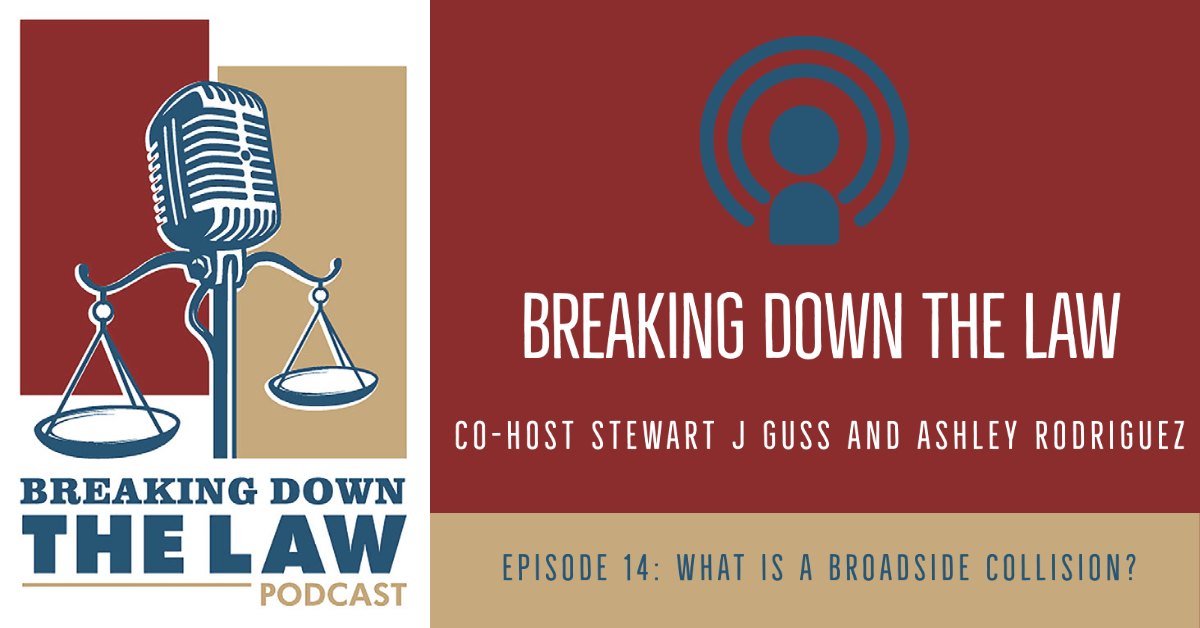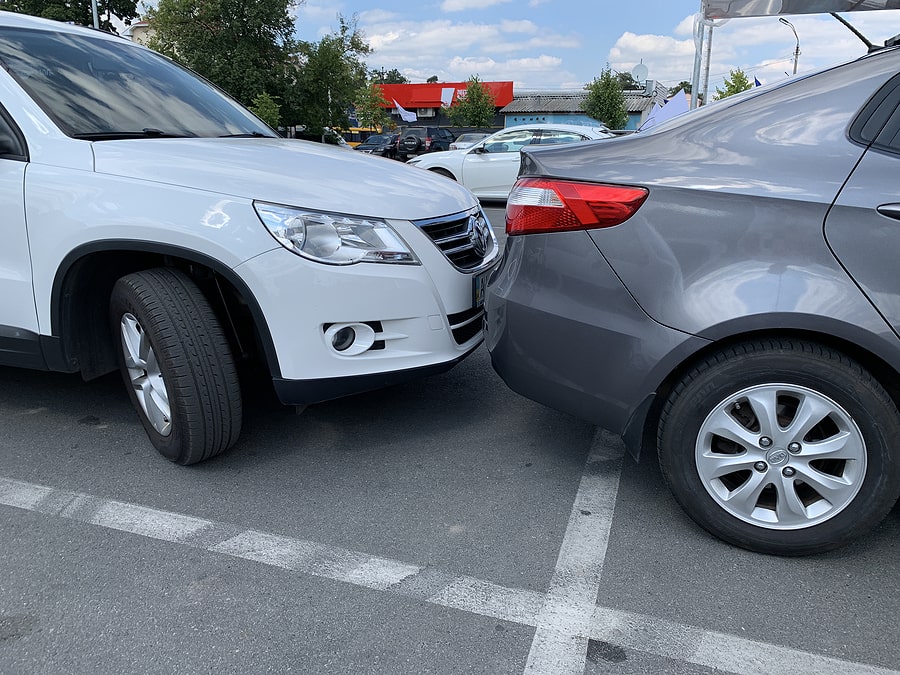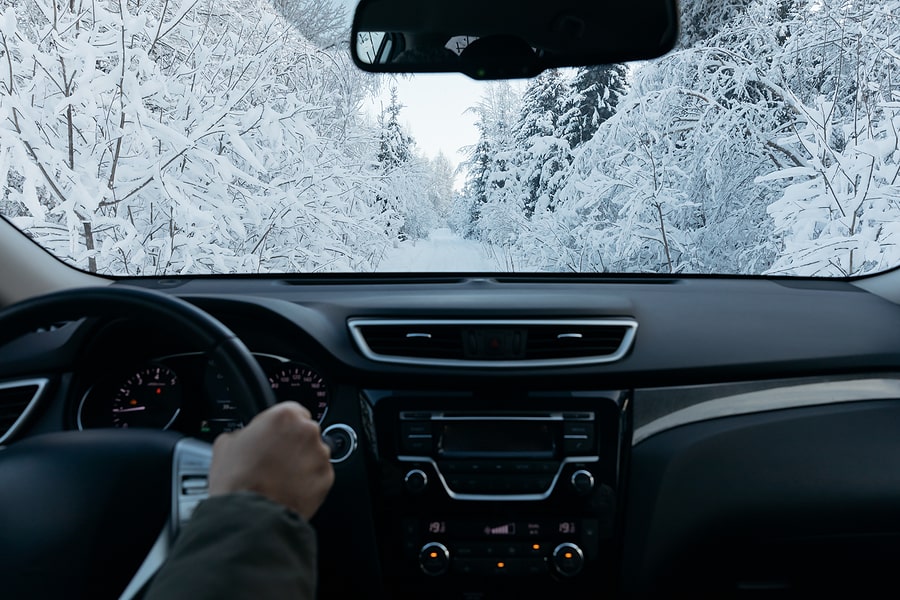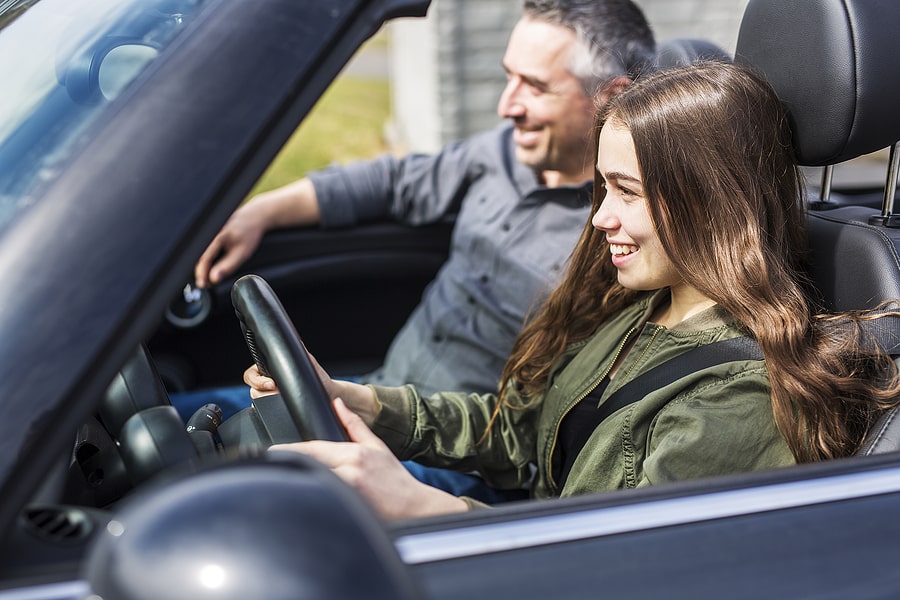For this episode of the Breaking Down The Law Podcast we’re joined by Brian Page, a New Orleans Car Accident Attorney. He’s joined by Breaking Down The Law Podcast host, Ashley Rodriguez.
During today’s episode, we’ll be learning exactly what a broadside collision is and the proper steps to take if you are in a broadside collision?
- What exactly is a broadside collision?
- What are the most common injuries with a broadside collision?
- Designs of cars to help with accidents.
- Airbags not deploying in broadside collisions.
- So is there usually clear liability in a broadside collision?
- Insurance issues.
- What do we do after a broadside collision?
Brian discusses these points and more, so we hope you’ll join us for this episode!
Stay tuned for the next installment of the Breaking Down The Law Podcast with Stewart J Guss and Ashley Rodriguez!
Contact Us: 281-783-3934 or [email protected]
If you want to subscribe to our podcasts on your favorite podcasts player click here for all the links to each one!
Transcript [This transcript was created using an automated transcription service and may contain errors]
Intro 0:09
Breaking down the law, a podcast hosted by attorneys and legal specialists discussing everyday law and how it affects regular people, regular people. Let’s break down the law with our host, Stewart Guss, and Ashley Rodriguez. They have the inside scoop on everything legal and newsworthy.
Ashley Rodriguez 0:34
Welcome to breaking down the law again. Today we’re going to talk about broadside collisions. And I’m Ashley, and we have a special guest with us today. Our Associate Attorney out of Louisiana, Brian Paige, how are you doing today?
Brian Page 0:49
I’m doing well. Ashley, how are you?
Ashley Rodriguez 0:51
I’m great. So how long have you been practicing personal injury law, Brian?
Brian Page 0:58
So I am in my 14th year practicing personal injury law. I basically started dabbling in it while I was still in law school as an assistant to a personal injury attorney. And then basically when I graduated law school and pass the bar, I immediately went to work for him. And I’ve done nothing but for my entire career.
Ashley Rodriguez 1:18
That’s awesome. So safe to say that you enjoy personal injury law.
Brian Page 1:22
Yeah, it’s my day to day. It’s what I enjoy doing. I like helping people. I like holding insurance companies accountable for what their contracts say they shouldn’t be doing that I can sleep well and i doing it because you know, as I always tell my clients, if insurance companies did what they were supposed to do, we wouldn’t be in this line of work. But unfortunately, we have to be because insurance companies are out to protect their bottom line and not their insurance or anybody that their insurance may injure.
Ashley Rodriguez 1:47
So have you always lived in Louisiana?
Brian Page 1:50
So I originally was born about 50 miles outside of Chicago. I moved down to Louisiana, specifically in New Orleans after I graduated college. I was a private investigator for a year actually working for insurance companies trying to, you know, catch people that may be defrauding a workman’s comp claim or something like that. got pretty burnt out on that I had a buddy that got moved to New Orleans for his job. And he offered to put me up to see if I liked it. So moved out in New Orleans. And within two months, I knew I probably was never going to live anywhere else and fell in love with the place and then went to law school down here. But my wife, who’s also an attorney, and the rest is history.
Ashley Rodriguez 2:30
That’s awesome. So New Orleans is your love and home from now on.
Brian Page 2:35
Yeah, absolutely. You know, God willing and the creek don’t rise as they say. As long as it was we’ll be here. I’ll be in New Orleans.
Ashley Rodriguez 2:43
Yes, New Orleans is definitely fun. Definitely a sense of community there.
Brian Page 2:49
Yeah, absolutely. It’s a It’s a special place with special people for sure.
Ashley Rodriguez 2:53
So let’s get right down into it. broadside collisions. What exactly is a broadside collision?
Brian Page 2:59
Yeah, so a broadside collision would be what most people would refer to as a T bone type collision. It’s, you know, on the front of another vehicle hits either one of the sides of the vehicle that you are in. People often say, you know, I got t boned? Well, that’s what they’re they’re talking about. They’re talking about a broadside-type accident.
Ashley Rodriguez 3:18
Yeah, and those are usually like out of nowhere because you don’t really see it coming.
Brian Page 3:22
Yeah, a hundred percent. I mean, most of them are going to be at an intersection of some sort. Obviously, there needs to be a car coming perpendicular to the path in which you were traveling in. So yeah, they generally happen when you know somebody either runs the stop sign runs a red light. Or you know, you could also get t boned if you are at a stop sign or a red light is if you enter the path of another vehicle.
Ashley Rodriguez 3:46
So what is the most common injuries with a broadside collision?
Brian Page 3:51
So when you’re in a broadside type collision, a lot of the safety mechanisms built into a vehicle that is there to protect you don’t necessarily function mainly what I’m talking about is the main drivers steering wheel airbag. Most of the time the broadside type collision now will not activate also your headrests it’s a pretty simple safety feature. Most people probably don’t even think about it, but that headrest is specifically designed to cushion your head and neck in the event that you are rear-ended there to keep your head from whipping back. If you ever see an old vehicle, you know 50s and 60s they didn’t have headrests. Well, what they learned in those types of accidents is that just adding a simple type of headrest onto the top of the seat can prevent a lot of neck injuries when you are rear ended. So in a broadside type collision, more modern vehicles may have side impact airbags, but a lot of vehicles still don’t. So when you’re hit in a broadside type fashion, your body is just kind of free to flip around depending on the direction in which you are impacted. A lot of times you know you’re can hit the window, you know, if you’re in a passenger in a vehicle on the passenger side, you know, your body is going to go to the direction of where you are impacted. So, a lot of times you’ll see head injuries out of, you know, broadside type accidents. Another thing is, is that you know, the neck itself is not necessarily that supported side to side. So, when you are involved in a broadside type injury, you know, you can also have a lot of neck injuries that stem out of that, because again, you’re not being cushioned by a headrest, you know, going into an airbag is if you ran into something else, you’re kind of just free to flop around and twist inside the vehicle based upon where the impact place.
Ashley Rodriguez 5:39
Yeah, that’s very interesting. I never really thought about that, like, because the neck rest is like kind of leaning forward a little bit. And so that makes sense. And I really did never thought about the airbag not going off because you’re hit from the side, you know?
Brian Page 5:52
Yeah, oftentimes, I mean, you know, when we’re investigating a new claim, oftentimes, my clients will say, Well, you know, my airbag didn’t even go off in this accident. And, and I have to do the same sort of explanation, because a lot of times, you know, people have heard about the airbag recalls and things like that. But I’ve got to explain to them that, you know, front airbag for the steering wheel on specifically, is really only there to go off when you have a direct front collision. So a lot of times, even if there’s a glancing type blow in an accident, the airbag won’t go off. And people often wondering why well, that’s also a built in safety feature of the airbag, they don’t want the airbag to go off if you’re in a glancing type accident, because it could push you then again into the side window, and you know, hit your head on the side window, or it could cause more injuries. So it’s really only there to if you’re going to run directly into something to cushion you from hitting the stairwell.
Ashley Rodriguez 6:45
Hmm, that makes sense. So is there usually clear liability in a broadside collision?
Brian Page 6:51
Yeah, I would say so. I mean, most the time somebody screwed up if there’s going to be a broadside type collision, somebody didn’t see somebody and pulled out in front of them, somebody you know, failed to know that their traffic light was yellow or red and continue to the intersection, most The Times someone’s going to be at fault. It’s not as clear liability is something like a rear-end collision. Because a lot of times, what you’ll find is that if there is an accident at an intersection, that is controlled by a stoplight, most of the time both parties involved are going to think or remember, remember. So that’s why, you know, it’s important when you have an intersection accident like that also, too, unless somebody who’s openly admitting that, yes, they ran it, they weren’t paying attention, they get on the phone with their insurance company and call it in right there and tell their insurance company that, you know, they had it wrong. And they were the cause of the accident. It’s important to get the police involved so that they can do a report, potentially locate any sort of witnesses, and get their statements taken down before somebody decides to leave the scene of the accident, and then change their story about what they were telling you or what actually took place. You should always get a police report, if you’re involved in accidents. A lot of times people just like to exchange information because they think it’s not a big deal. But you know, time and time again, I’ve gotten into situations where I’m having a client Tell me Well, at the scene, they said this, they said they were at fault, they gave me all their information. And then lo and behold, when I call to open the claim, they’ve changed their story, they’ve told their insurance company something else, and then it just turns into a claim that likely will end up in litigation. So documentation of the facts of what took place. And any sort of witnesses that you may be able to access at the scene of the accident is important.
Ashley Rodriguez 8:42
Definitely witnesses for sure can help. Yeah, and some people like they just lie that this is my insurance, and it’s not and then you don’t want to get in that situation where you have no idea who was actually in the accident with you.
Brian Page 8:54
Yeah, very true. And you know, oftentimes, what we’ll run into is, you know, you can purchase insurance, get an insurance car that then you print off and keep in your vehicle and turn around and cancel the insurance immediately. I mean, the card may say that I’ve got insurance through December of 2020. But I canceled it yesterday, and I still have that card. They don’t require you to turn in your insurance card when you cancel your policy. I know.
Ashley Rodriguez 9:19
I don’t think about that. But a police officer could verify that they actually have insurance.
Brian Page 9:23
They can run it, see if it’s valid, and that sort of thing. And those things are important, you know, again, so that you don’t get stuck with bad information.
Ashley Rodriguez 9:31
It’s always important to have your insurance because you never know. Yes, absolutely. So what typically causes a broadside collision, and just mainly, I’m not paying attention.
Brian Page 9:42
Yeah, I mean, in my experience, that’s what I’ve generally seen. It’s either someone not paying attention to their life, not noticing that they had a stop sign or a yield sign. Or somebody you know, I’ve had the occasion where someone intentionally thinks that they’re just I’m going to run the stop sign. I don’t see anybody coming in is completely fine. You know, I’m on a back road somewhere, it’s quiet, it’s nighttime, I’m out screwing around and they decide to run a stop sign and then cause the accident. So generally it is either inattentiveness or just reckless operation of the vehicle that that’ll end up, you know, causing a broadside type x.
Ashley Rodriguez 10:18
So, once again, you know, we’ve been in that accident. But now it’s a broadside collision. Maybe our injuries are a little bit more, we can’t get out like, what is our next step? What do we do after broadside collision?
Brian Page 10:31
Yeah, ultimately, what I would suggest to somebody is to contact the police immediately, once you contact the police, there’ll be able to dispatch you to know, ambulance, or fire or whatever may be needed. roadside type accidents, if severe enough, are oftentimes the ones that will need extraction from the vehicle simply because you know, the doors aren’t operating on one side or the other. That type of impact can also twist the frame of vehicles and make it difficult to get the doors open. So you know, the fire department may need to come with, you know, the jaws of life to cut the door open for you to be able to get out. So first and foremost, I always suggest contacting the police, you know, reporting what took place and whether or not you were injured so that they can dispatch the appropriate assistance that you may need.
Ashley Rodriguez 11:14
Yeah, you know, is number one.
Brian Page 11:16
Yeah, absolutely. Absolutely. And then again, once the officer is there and involved, you know, they’re going to do the investigation for you. It’s not, you’re not going to have to talk to the other driver, if you don’t want to about you know, who’s your insurance company? What were you thinking? What were you doing what, why weren’t you paying attention to all those things that may come up when you’re in an accident, you kind of have the adrenaline pumped in and you know, heightened irritability, potentially at that time, if you’re injured, and you know, you just bought your brand new car, and you’ve only had it for a couple of weeks, and then somebody you know, blows to a stop sign and takes it out. So you get the police involved. They can help you with medical, if you need it, they’ll get the insurance information from the other driver and their name. They’ll document all that stuff for you. So that once the police report is ready, you’ve got basically everything you need. Yeah, absolutely a good description of what took place and all the information that you may need to pursue a claim.
Ashley Rodriguez 12:09
Yeah, and speaking of that adrenaline like we all know, like after an accident when your adrenaline’s pumping, you might not even feel like your hurts, but definitely stuff can set in in the next couple of days. So it’s always good to, you know, get checked out.
Brian Page 12:24
Yeah, I mean, that’s the most common experience, most people have, you know, I mean, you kind of feel like Superman after it happens, because you’ve got all this adrenaline rushing through you and you think you’re that you’re alright, he may even tell, you know, the other driver or the officer, I’m fine, I don’t need anything, then you know, you go home and things start wearing off and you may be a little bit sore, you lay down, you know, to go to sleep that night, you wake up the next morning or the or the following day. And then that’s really when stuff starts to set in. When you sleep on the type of injuries that are generally caused by motor vehicle accidents, you know, whiplash and things like that. That’s really when everything tightens up. And you really start to notice that the problems that you’re having,
Ashley Rodriguez 13:01
yeah, so it’s always better to be safe than sorry, and just get checked out.
Brian Page 13:05
Hundred percent. Yeah, I mean, you know, most of the time, you’re not going to have some sort of broken bones or anything like that. But it’s good to get in, at least let a doctor Look at you, you know, get your symptoms documented so that if something then ultimately comes up down the road, the doctors know that we gave him an X ray. After the accident, he was complaining of abdominal pain, but we didn’t see anything on the X-ray. So we released them. But you know, then the next day you go in and they do a CT scan and maybe find something was actually there that an X ray was missed. So it’s always important to get checked out back and know how you’re feeling. And then just monitor how you’re feeling in the days following. Hopefully, it goes away. Hopefully, you don’t have any sort of issue. Most of the time, you know, you’re going to have some sort of soft tissue type injury that’s going to require, you know, maybe some chiropractic type treatment and could resolve over the course of a couple of months. But yeah, it’s always important to get everything documented so that it’s there on paper, in the event that you need to make a claim down the road.
Ashley Rodriguez 14:02
Alright, so Brian, do you think there’s anything else you would like to tell us about broadside collisions? Or do you think we covered it all?
Brian Page 14:09
I mean, I think we covered it all. Just be safe, you know, pay attention. Don’t be distracted driving, get off your cell phones. Turn to what you want, believe that they’re and just be safe and look out for others.
Ashley Rodriguez 14:22
Definitely. Well, thank you for being on the show.
Brian Page 14:25
It was my pleasure.
Ashley Rodriguez 14:27
Thank you again for listening to our podcast about broadside collisions. And if you’ve been in a broadside collision, and you need help, we operate in all 50 states. Just call to 281 783 3934. Thank you.





